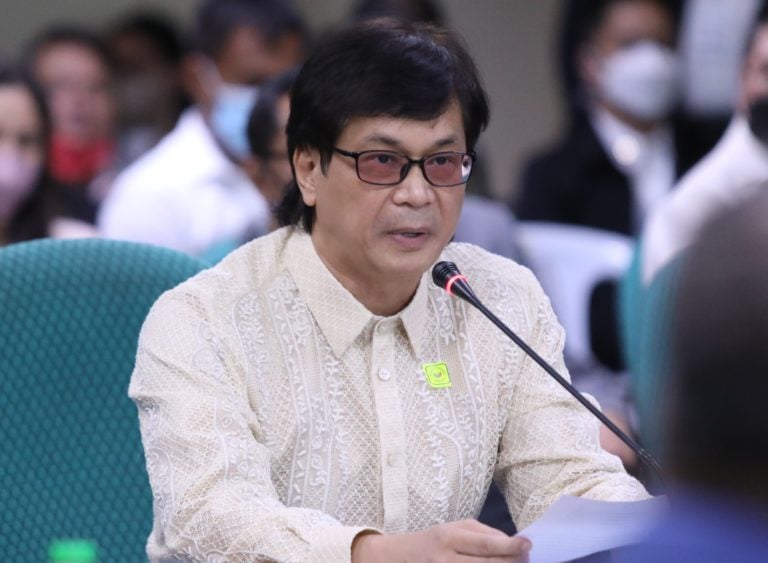Vote-buying via e-wallets will be closely watched, offenders face jail time

Interior Secretary Benjamin Abalos Jr. (File photo from the Senate Public Relations and Information Bureau)
MANILA, Philippines — Vote-buying through e-wallets and other digital payment platforms will be closely monitored by the Department of the Interior and Local Government (DILG) and the Commission on Elections (Comelec) with offenders facing possible jail time.
On Monday, October 30, the country will elect its new set of barangay and Sangguniang Kabataan (SK) officials.
“I am therefore warning these crooked politicians: Do not even think about it. We will go after you and make sure that you will be punished for cheating in the elections,” Interior Secretary Benhur Abalos said in a statement on Tuesday.
Abalos said the DILG would ask e-payment platforms—the statement mentioned GCash and Maya — “to closely monitor and identify suspicious activities related to vote-buying and to suspend their accounts.”
The agency would work closely with the Department of Information and Communications Technology (DICT) to have the needed technical and regulatory support for monitoring and tracking suspicious electronic transactions emanating from BSKE candidates.
The Commission on Elections (Comelec) has also monitored campaigns being done on social media platforms, noting they could be potential avenues for vote-buying or selling.
‘Anonymous’ no more
According to Comelec spokesperson John Rex Laudiangco, candidates are prohibited from sending digital coins—usually in the form of tokens, stars, or chips — to their supporters during the campaign period, which started on Oct. 19 and would end on Oct. 28.
“Candidates thought it is safer now to commit vote-buying and selling because they remain anonymous. But they are wrong. These transactions leave digital footprints and track records,” Laudiangco said. “Even if a candidate just used a middleman or a dummy to commit these election offenses, they will still be prosecuted.”
The SIM (subscriber identity module) card registration law enacted in 2022 will help authorities identify users of mobile payment apps.
READ: Tumulak calls out ‘massive’ vote buying in Cebu City: Shame on them
As of July 30, the end of the seven-month mandatory listup, data from the National Telecommunications Commission showed that 113.97 million, or 67.83 percent of the 168 million SIM cards issued, were registered. Telecommunication companies have deactivated all those that failed to register.
Comelec monitoring
For the first time in the history of Philippine elections, the Comelec is monitoring digital transactions for online vote-buying and selling.
Vote-buying and vote-selling, as defined in the Omnibus Election Code, refer to offering money or anything of value to induce anyone to vote for or against any candidate or withhold his vote.
On Aug. 30, the Comelec promulgated Resolution No. 10946, creating a committee on “Kontra-Bigay” to expose and build cases over the illegal practice.
READ: Lawmaker: Declare vote-buying a heinous crime
Under the resolution, online financial transactions exceeding P500,000 and made during the election period without any clear underlying purpose may be flagged as vote-buying and vote-selling.
The Comelec said it had the authority to inquire into the financial records of candidates on its own and may seek the assistance of concerned government agencies in the investigation.
Among the agencies forming the committee are the DICT, the Cybercrime Investigation and Coordinating Center, the Bangko Sentral ng Pilipinas, and the Anti-Money Laundering Council (AMLC).
The National Bureau of Investigation’s Cybercrime Division and the Philippine National Police’s Anti-Cybercrime Group will also assist the Comelec in gathering evidence.
Sanctions
During the 2019 midterm elections, Laudiangco recalled, the Comelec had already conducted exploratory talks with financial institutions on the matter, although digital transactions at that time were not yet that common.
It was during the pandemic years that they rapidly grew, he noted.
The AMLC said it would ensure that proceeds from unlawful activities would not be laundered during the 10-day campaign period, as it ordered financial institutions to submit suspicious transaction reports.
Both GCash and Maya, the country’s biggest e-wallet platforms, have promised Comelec that they would prevent the misuse of their digital financial services for vote-buying and selling.
Individuals found by the Comelec to have committed vote-buying or vote-selling face imprisonment of up to six years, may be disqualified from holding any public office, and may lose their right to vote.
RELATED STORIES:
Comelec: Nearly 1,000 vote buying cases under investigation
Help desk against vote-buying launched by Lapu police
Disclaimer: The comments uploaded on this site do not necessarily represent or reflect the views of management and owner of Cebudailynews. We reserve the right to exclude comments that we deem to be inconsistent with our editorial standards.
